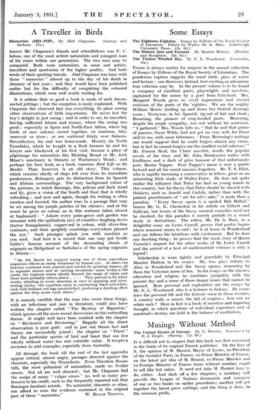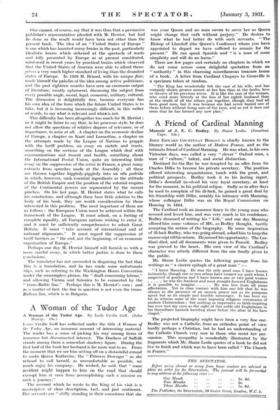Musings Without Method
The United States of Europe. By E. Horriot. Translated by R. J. Dingle. (Harrap. 12s. 6d.)
IT is difficult not to suspect that this book was first conceived in the brain of its original French publisher. On the face of it, the opinion of M. Herriot, Mayor of Lyons, ex-President of the Socialist Party in France, ex-Prime Minister of France, on the latest pet idea of M. Briand, ex-Prime Minister and ex-Foreign Minister of France times without number, ought to sell like hot cakes. It need not take M. Herriot long to do, either. Just dash off a few chapters, a secretary will provide the League of Nations documents and synopses of one or two books on earlier precedents; another will get together the latest press cuttings, and the thing is done, to the common profit.
One cannot, of course, say that it was thus that a persuasive publisher's representative pleaded with M. Herriot, but had he done so the result would have been not other than the present book. The idea of an " States of Europe " is one which has haunted many brains in the past, particularly idealistic brains which sickened at the spectacle of waste and folly presented by Europe as at present constituted, reinforced in recent years by practical brains which observed that the United States of America were able to afford them- selves a very much higher standard of living than the disunited states of Europe. In 1929 M. Briand, with his unique fair, made himself the paladin of the idea among active politicians, and the past eighteen months have seen an enormous output of literature, mostly ephemeral, discussing the subject from every possible angle, moral, legal, economic, military, cultural. The discussion is delightfully free, because everyone has his ()vim idea of the form which the future United States is to take, but it is becoming increasingly difficult, in this welter of words, to say what is relevant and whalp is not.
This difficulty has been altogether too much for M. Herriot ; or it might be fairer to say that, in his generous style, he does not allow the questions of relative degrees of relevance, or of importance, to arise at all. A chapter on the economic decline of Europe, a chapter on Kant and Lamartine, a chapter on the attempts made by the League of Nations to grapple with the tariff problem, an essay on cartels and trusts, something on the sections of the League which deal with communications and transit and health, something about the International Postal Union, quite an interesting little essay on the suppression of the octroi in France, a great many
extracts from speeches made at the Assembly ; all these are thrown together higgledy-piggledy into an olla podrida in which, however, such essential ingredients as the attitude of the British Empire and the position of the colonial empires
of the Continental powers are represented by the merest pinches. On his last page, M. Herriot states what lie calls his conclusions, and although these bear little relation to the body of his book, they are worth consideration by those interested in this problem. The most important of them are as follows : the European Union must be achieved within the framework of the League. It must admit, on a footing of complete equality, all European nations wishing to enter it, and it must be sufficiently comprehensive to admit Great Britain. It must " take account of international and of national alignments." It must regard the suppression of tariff barriers as " the end, not the beginning, of an economic organization of Europe."
Perhaps one day M. Herriot himself will furnish us with a more careful essay, in which better justice is done to these conclusions.
The translator has not succeeded in disguising the fact that this is a translation, and he has made some unfortunate slips, such as referring to the Washington Hours Convention under the meaningless phrase, the " draft concerning labour," and allowing Vienna and Salonica to be connected by the " trans-Baltic line." Perhaps this is M. Herriot's own ; and as a matter of fact, the line in question is not even the trans- Balkan line, which is in Bulgaria.







































 Previous page
Previous page